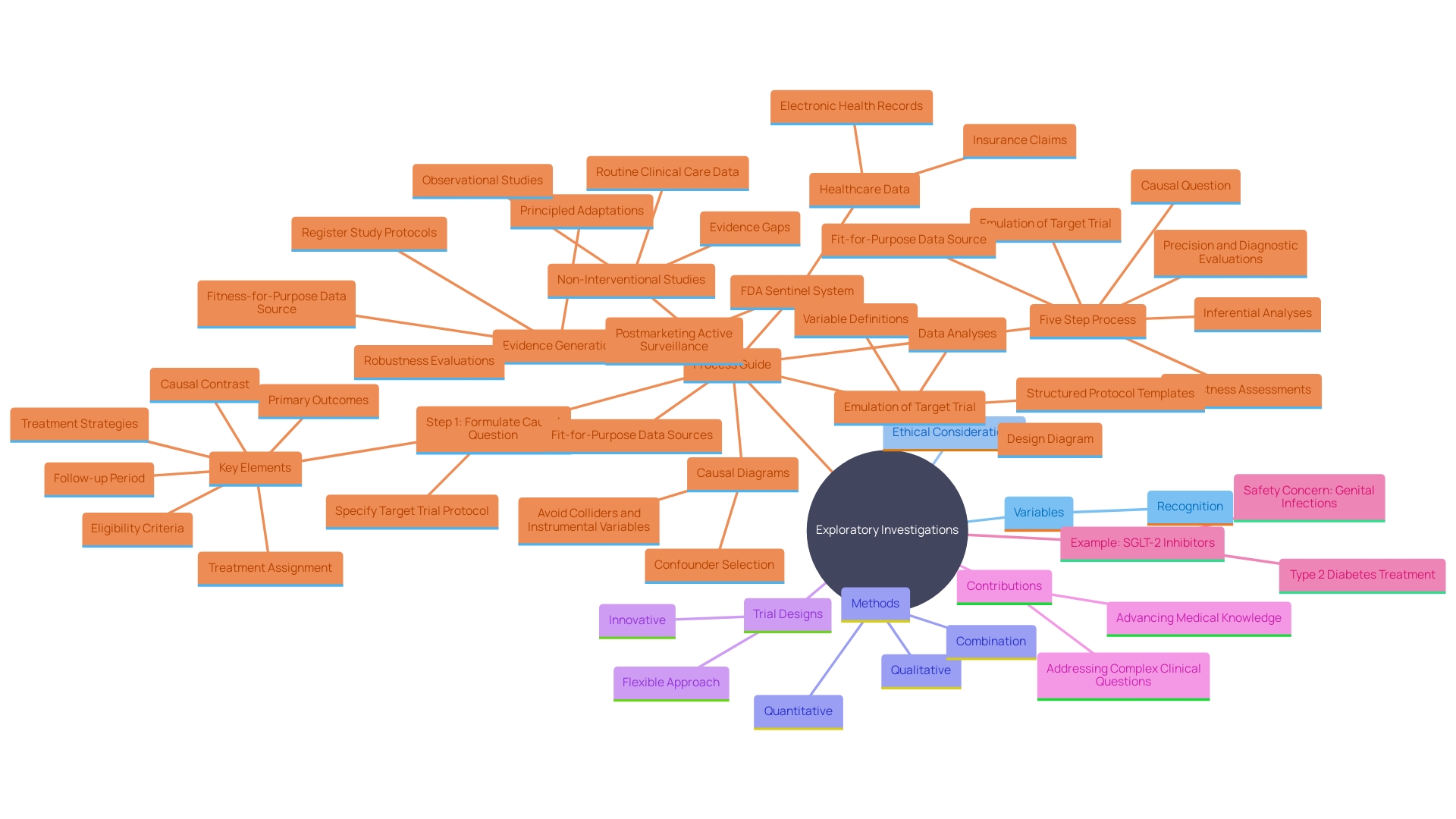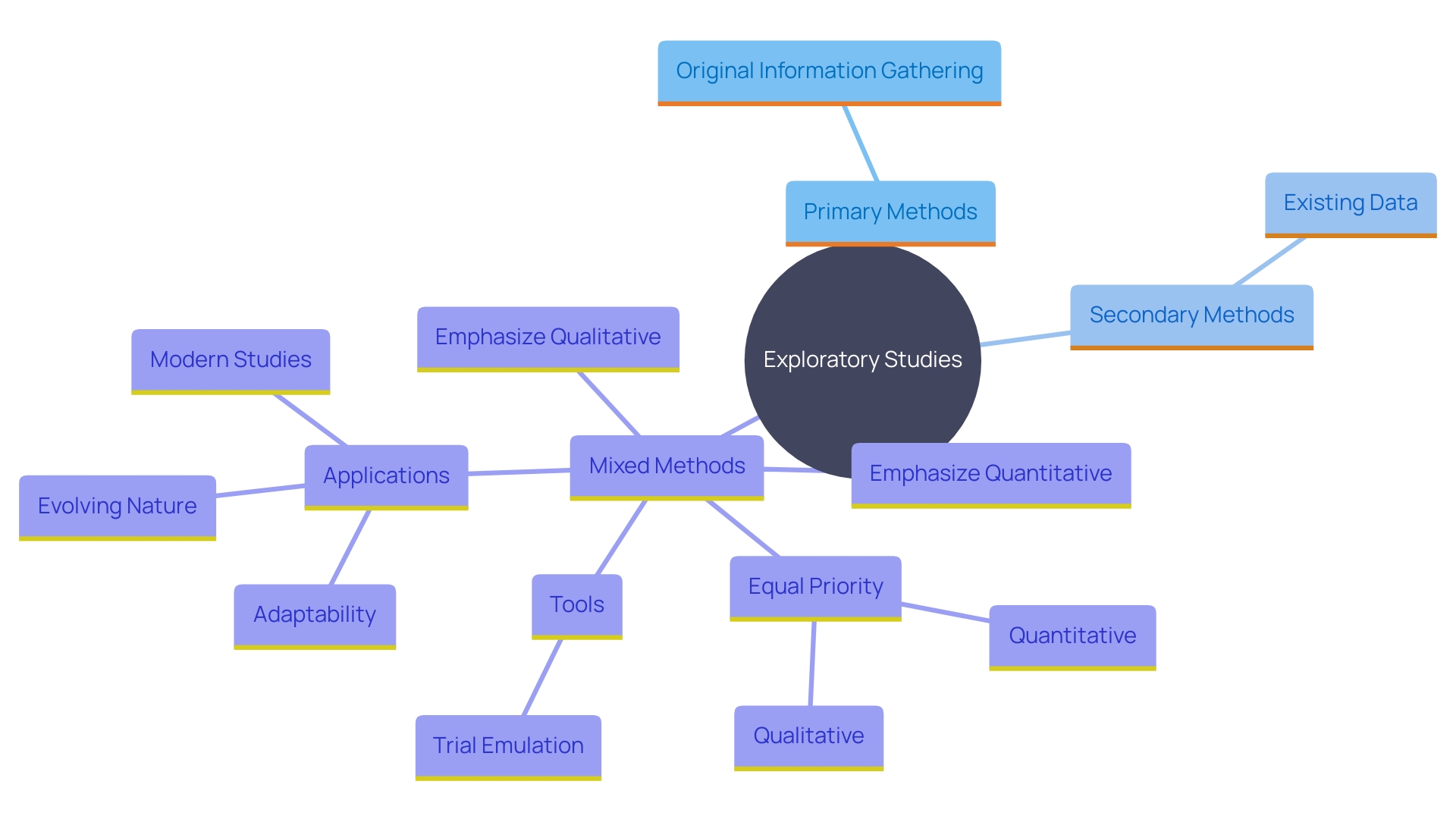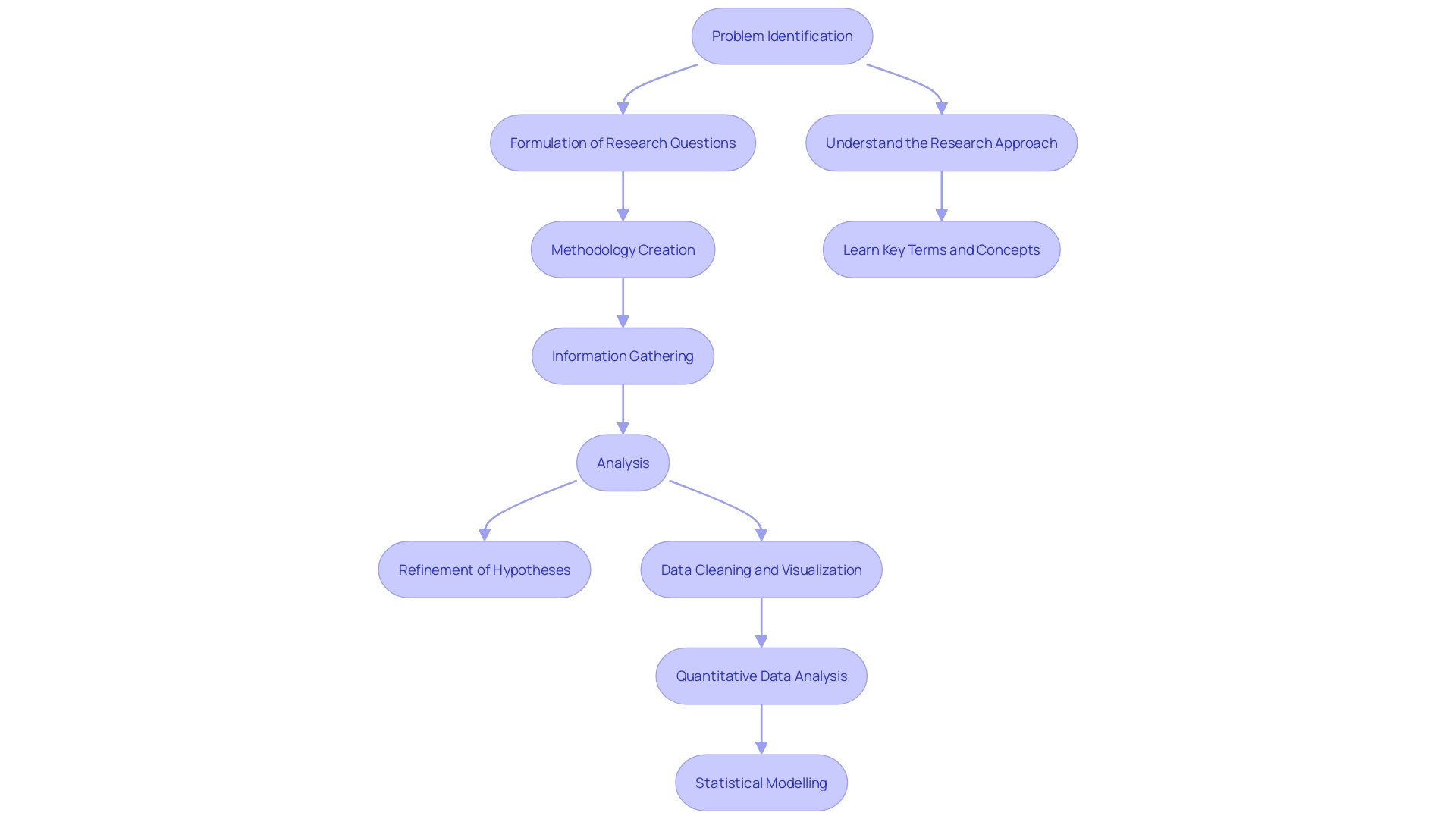Introduction
Exploratory research acts as the foundational phase in the research process, providing a critical platform for investigating areas with limited existing knowledge. This approach is instrumental in recognizing variables, comprehending contexts, and formulating hypotheses. For example, integrating qualitative techniques like content and thematic analysis with quantitative methods such as descriptive statistics and multiple logistic regression, as seen in recent studies, enriches the data analysis process and enhances the robustness of findings.
Ethical considerations are paramount, with research ethics boards, like those at Western University and Lawson Health Research Institute, approving studies to ensure compliance and protect participant privacy. Exploratory research often benefits from open science principles, which promote collaboration and the organic nature of qualitative research, ultimately deepening the impact and reach of the results.
Moreover, the flexibility inherent in exploratory research allows for innovative trial designs. Trials might simultaneously test new techniques to reduce cancer cell dissemination, compare nerve-sparing approaches for potency effects, or assess the anatomical preservation for postoperative urinary function. Stratified randomization ensures balanced comparison groups, maintaining the integrity and comparability of prognostic factors.
The open-ended and adaptable nature of exploratory research encourages discovery and adaptability, crucial for addressing complex clinical questions and advancing medical knowledge.
Definition and Purpose of Exploratory Research
Exploratory investigation serves as the foundational phase in the inquiry process, offering a vital platform for examining areas with limited existing knowledge. This approach is instrumental in recognizing variables, comprehending contexts, and formulating hypotheses. For instance, combining qualitative approaches like content and thematic analysis with quantitative techniques such as descriptive statistics and multiple logistic regression, as observed in recent research, enriches the data analysis process and strengthens the robustness of findings.
Ethical considerations are paramount, with ethics committees, like those at Western University and Lawson Health Research Institute, approving studies to ensure compliance and protect participant privacy. Exploratory investigations often benefit from open science principles, which promote collaboration and the organic nature of qualitative inquiries, ultimately deepening the impact and reach of the results.
Moreover, the flexibility inherent in exploratory investigations allows for innovative trial designs. Trials might simultaneously test new techniques to reduce cancer cell dissemination, compare nerve-sparing approaches for potency effects, or assess the anatomical preservation for postoperative urinary function. Stratified randomization ensures balanced comparison groups, maintaining the integrity and comparability of prognostic factors.
The open-ended and adaptable nature of exploratory inquiry encourages discovery and flexibility, crucial for addressing complex clinical questions and advancing medical knowledge.

Types of Exploratory Research
Exploratory studies encompass two main categories: primary and secondary methods. Primary investigation entails the gathering of original information, frequently through surveys, experiments, or direct observations. This method guarantees that the information is specifically customized to the inquiry being addressed. On the other hand, secondary analysis utilizes existing data to draw conclusions. This can include examining datasets from earlier research, which is often more cost-effective and time-efficient.
Both primary and secondary investigation methods are crucial for comprehensive insights. For instance, a case study concentrating on the analytic phase of investigation utilized numerical analysis of an online collection with statistical modeling. 'The steps included information cleaning and visualization, emphasizing the importance of understanding key terms and concepts.'. This method emphasizes the equilibrium between information gathering and the analytical procedures necessary for comprehensive investigation.
Additionally, mixed approaches scholars may assign equal importance to both numerical and descriptive inquiries or highlight one more than the other, based on practical limitations and audience tastes. This adaptability enables scholars to modify their approaches to optimally fit the information and study goals, whether they are seeking an in-depth qualitative insight or a wide quantitative summary.
In modern studies, tools like trial emulation allow investigators to design observational or simulated investigations. This method can quantify the effect of a treatment by comparing outcomes between groups using existing data, supplementing traditional clinical trials. Such methodologies emphasize the changing environment of clinical studies, where innovative approaches continue to enhance our understanding and application of medical treatments.

Steps to Conduct Exploratory Research
'Conducting exploratory investigation comprises several crucial steps to ensure thorough and reliable outcomes.'. Initially, identifying the problem or area of interest sets the foundation for the study. Following this, formulating clear and concise research questions is vital to narrow down the focus and direct the investigation effectively. Creating the methodology follows, where researchers select suitable methods to collect pertinent information. This stage often involves quantitative information analysis, statistical modeling, and cleaning to prepare the dataset for analysis. 'The information gathering stage follows, during which researchers collect the necessary details through various means such as surveys, experiments, or online datasets.'.
Once the information is gathered, the analysis phase begins. This involves detailed steps of information visualization and interpretation to uncover patterns and insights. For example, using statistical models to analyze data can help in making specific, measurable, and reproducible claims. Researchers then refine their questions and hypotheses based on these findings, ensuring that the study's objectives are met with precision. This iterative process enables ongoing enhancement and verification of the outcomes, ultimately resulting in more robust and impactful conclusions.

Advantages and Disadvantages of Exploratory Research
Exploratory studies offer several benefits, such as flexibility and cost-effectiveness, allowing investigators to adjust their methodologies as new insights arise. This adaptability is crucial in medical trials, where the goal is to balance finding the correct answers, providing the best treatments, and maintaining cost efficiency. For instance, the evaluation of sodium-glucose cotransporter-2 (SGLT-2) inhibitors for type 2 diabetes treatment highlights how adaptable studies can address emerging safety concerns like genital infections. However, exploratory investigation also has its drawbacks. It often lacks generalizability, as findings from specific studies may not apply broadly across different populations. Additionally, the process can be time-consuming. This can hinder overall research efficiency, especially when resources are limited. Despite these challenges, innovative methods like trial emulation can help mitigate some of these limitations by using existing data to supplement traditional clinical trials, thus saving time and resources. As Nigwekar points out, "Instead of having to do five trials, maybe we can do only two or three and then use the simulation for the remaining two."
Conclusion
Exploratory research serves as a vital starting point in the research process, enabling the investigation of areas where knowledge is limited. By combining qualitative and quantitative methods, researchers can enhance data analysis and derive more robust findings. Ethical considerations, reinforced by research ethics boards, ensure compliance and protect participant privacy, while principles of open science promote collaboration and transparency.
The flexibility of exploratory research allows for innovative trial designs that can address complex clinical questions and significantly contribute to advancing medical knowledge.
Two primary categories of exploratory research—primary and secondary methods—each play a crucial role in obtaining comprehensive insights. Primary research provides tailored data through direct collection, while secondary research utilizes existing data, often proving to be more cost-effective. The integration of mixed methods enables researchers to adapt their approaches according to specific research objectives, facilitating a balance between qualitative insights and quantitative data.
Conducting exploratory research involves systematic steps, from identifying the research problem to data collection and analysis. This iterative process allows for refinement of research questions and hypotheses, ensuring that the study outcomes are reliable and impactful. While exploratory research offers notable advantages such as flexibility and cost-effectiveness, it also presents challenges, including potential limitations in generalizability and time efficiency.
Nevertheless, innovative methodologies, like trial emulation, can help address these challenges, ultimately enhancing the efficiency and effectiveness of clinical research.




